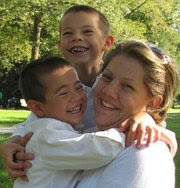It has been my experience that children learn to read when they're ready to learn to read. My experience is taken from children I nannied for, my own children and many friends' children. Teaching reading is quite simple and is not the rocket science the education world makes it to be. Parents who can read themselves are more than qualified to teach their children to read. Special degrees are not requirements! Not every child needs to be, should be, or will be three or four years of age when learning to read. Each finds their own motivation. It is not difficult - it simply takes patience, time and encouragement on the part of the parent.
There are things we can do to prepare our children for reading from even the earliest days of life.
Here are a few.
- Talk to your children. Infants included! This helps them learn language. It helps their conversation skills, it helps them learn tone and inflection. It begins to build relationship between you and the child, even before they can fully understand your words. It helps them decipher sounds, and it reassures them of your presence.
- Build a library. Begin when your children are young to build a library for them. Books can be found cheap or free at any yard sale or library book sale. Do not keep 'twaddle' (a term coined by Charlotte Mason for books of little value). Instead, keep books that are of great worth - there are many!
- READ! It's difficult, perhaps near impossible, to raise readers if you are not a reader yourself. Set the example. Let your children see you reading often. Your love of books will rub off.
- Read to your children daily! This is extremely important. This teaches that we read from left to right and how pages are turned. It teaches tone and inflection in reading. It aids conversation skills, language skills, vocabulary, pronounciation. It fosters a love for reading, for books, for the time spent snuggling together, sharing the words on a page.
- Don't stop reading to your children! Children who read well on their own still enjoy being read to as they get older. Don't think that because your child can read he no longer needs to be read to!
- Encourage, encourage, encourage - but DON'T push! Like potty training, if it's pushed on the child they will reject it. Encourage their efforts and success. Reward, cheer, make a big deal of the sounding out of those first words. Remember to encourage the two year old who recognizes that a Dairy Queen sign in a new town, a place he has never visited, is synonymous with "I- Keem" (ice cream). It's early decoding. It might be the colors of the sign and the style of the building and all more than the words themselves, but it's the same principle!
- Be patient. Sit through the sometimes painful half-hour-long reading of those very first readers. "See Jane Run" can seem to take an eternity for an early reader to spit out. DO NOT tell them what it says assuming they can't figure it out, if they have the desire to try! Use your finger to point to each letter as they blend the sounds. Remind them of the sounds they've already deciphered "J- A-...... then wait for them to fill in the N as you point" If they truly don't know, help them out but don't rush to their aid.
- Use a simple phonics based approach. Letters make sounds, sounds squish together to make other sounds. Very simple. Kids will learn sight words quickly. In just weeks of daily patient listening over the shoulder of a beginning reader, kids will begin to very quickly recognize those sight words that are often used - the, a, an, on, of... That's great! Encourage that. They still have the ability to sound out new words which will help them later on.
- Forget the "rules" of reading. To drill a child on reading rules (silent e, and long vowel vs. short for example) distracts from reading. Much of reading is common sense. 'Bak-E' is not the word. It's 'bake'. You can point out at times that the e is silent because it does it's job in making the 'A' a long 'A', if you want, but it's not necessary. Children will learn the rules simply from experiencing them.
- Forget about the alphabet! Use flashcards to help teach letter sounds - not names! Letter names are not important until later on. The alphabet is useless in teaching a child to read. A little one knowing the alphabet song is not a sign of reading readiness.
- Play games. I Spy is a great one! "I spy with my little eye something that begins with "T-" (letter sound, not name!) Another is to read road signs and store/restaurant/gas station signs when driving in the car. I remember sitting at a stop light sounding out "Bertucci's" with Isaiah when he was very small.
Each child is different. Each is driven to learn by different means. Isaiah was driven by a desire to learn. He loved birds and so desired to be able to read his field guide that that was what motivated him. Elijah, always one to be up for a good competition, wanted to read what his brother was reading. Elijah at age two would get up early in the morning and retreat to the sunroom. He had miniature Precious Moments flash cards that we kept in a little plastic baggie. He would drill himself for hours each morning: "U-u- Umbrella. B-b butterfly". Morning after morning, he would be at my bedside when I would wake, flashcards in hand, waiting for his daily drill. It took a long time for him to get them all right - but he so badly wanted to read. He needed to do it on his terms, and in his time. Once he had the sounds all right, we moved on to early readers.
God gave us His Word in written form. He gave us His Word - His living, inerrant, Word that will last forever. If his Word is to be a sword, a light to our path, the Truth that sets us free, the Spirit that gives life, if it is to be a source of hope and encouragement, if we are to meditate on it day and night, if we are to obey and cherish His Word - should not we read it well and often? Should we not require the same of our children?
* It bears stating that I do recognize that there are exceptions to the general rule. There are disabilities that prevent or delay a child's natural ability to learn to read. This post does not address those special circumstances. *










2 comments:
I love the fact that you're raising readers and encouraging others to do the same. Books have been such a constant joy in my life, ever since I begged my mom to teach me when I was four. Now both my boys love to read, and I take great joy in that. :) Welcome to The High Calling network. I think you'll find a lot of kindred spirits--and book-lovers--in our community.
Thank you, Dena, for welcoming me! I look forward to connecting more in the weeks and months ahead.
Post a Comment